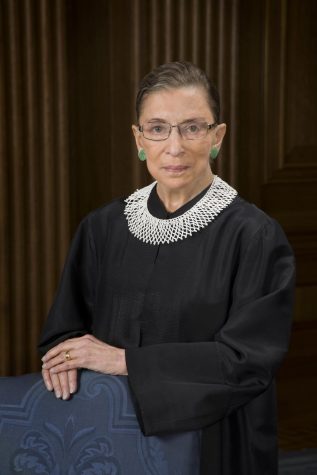Students react to death of Ginsburg
October 5, 2020

The recent passing of Associate Justice Ruth Bader Ginsburg has affected the lives of many people. She was admired by many for her influence in favor of women’s and LGBTQ+ rights. After battling pancreatic cancer for nearly 22 years, Ginsburg died at 87 years old. Ginsburg was the first woman and person of Jewish heritage in history to lie in state at the United States Capitol.
In the U.S., lying in state is traditional for recently deceased public officials. The body of the deceased is placed outside of a government building for the public to pay their respects. Abraham Lincoln, John F. Kennedy and 10 other U.S. presidents have lied in state. Many people who lied in state, whether positive or negative, have had a big influence on the U.S. and are thought of as role models to people of all generations.
“I do think of [Ginsburg] as a positive role model,” junior Ember Suter said. “She was a huge women’s rights activist who fought for equal pay, equality in law and the workplace, and so much more.”
While many people view Ginsburg as a positive role model, others disagree. Many supporters of the Black Lives Matter movement lost respect for the late supreme court justice when she dismissed the movement and did not approve of its actions. Large numbers of people who loved Ginsburg for fighting for equality for women and the LGBTQ+ community are the same people who support the Black Lives Matter movement and therefore struggle to continue to show her support.
“She was known to not support the Black Lives Matter movement or understand police brutality,” junior Cynthia Torres said. “I don’t necessarily see her as someone I would admire.”
Ginsburg dedicated most of her life to achieving equal rights for women in the U.S. She attended two Ivy League schools, obtaining her bachelor’s degree from Cornell University and her law degree from Harvard University. Once she graduated from Harvard, she went on to clerk for District Judge Edmund L. Palmieri. She also taught at Rutgers University Law School and Columbia University. President Clinton appointed Ginsburg to the Supreme Court in 1993 after she served the U.S. court of Appeals for the District of Columbia for 13 years.
“One of the most important things [Ginsburg has] done is help to legalize gay marriage,” Torres said.
Ginsburg helped pass many laws in favor of equal rights for women and the LGBTQ+ community. In 2016 history was made, when Ginsburg voted in favor of the legalization of same-sex marriage. Her work in favor of women’s rights included co-founding the Women’s Rights Project to protect people from gender discrimination in the workplace.
“Her most important accomplishment was showing many young women that with a great deal of determination and resilience they can change the world,” Suter said.




















